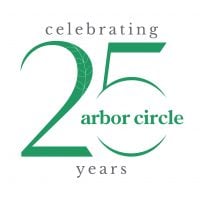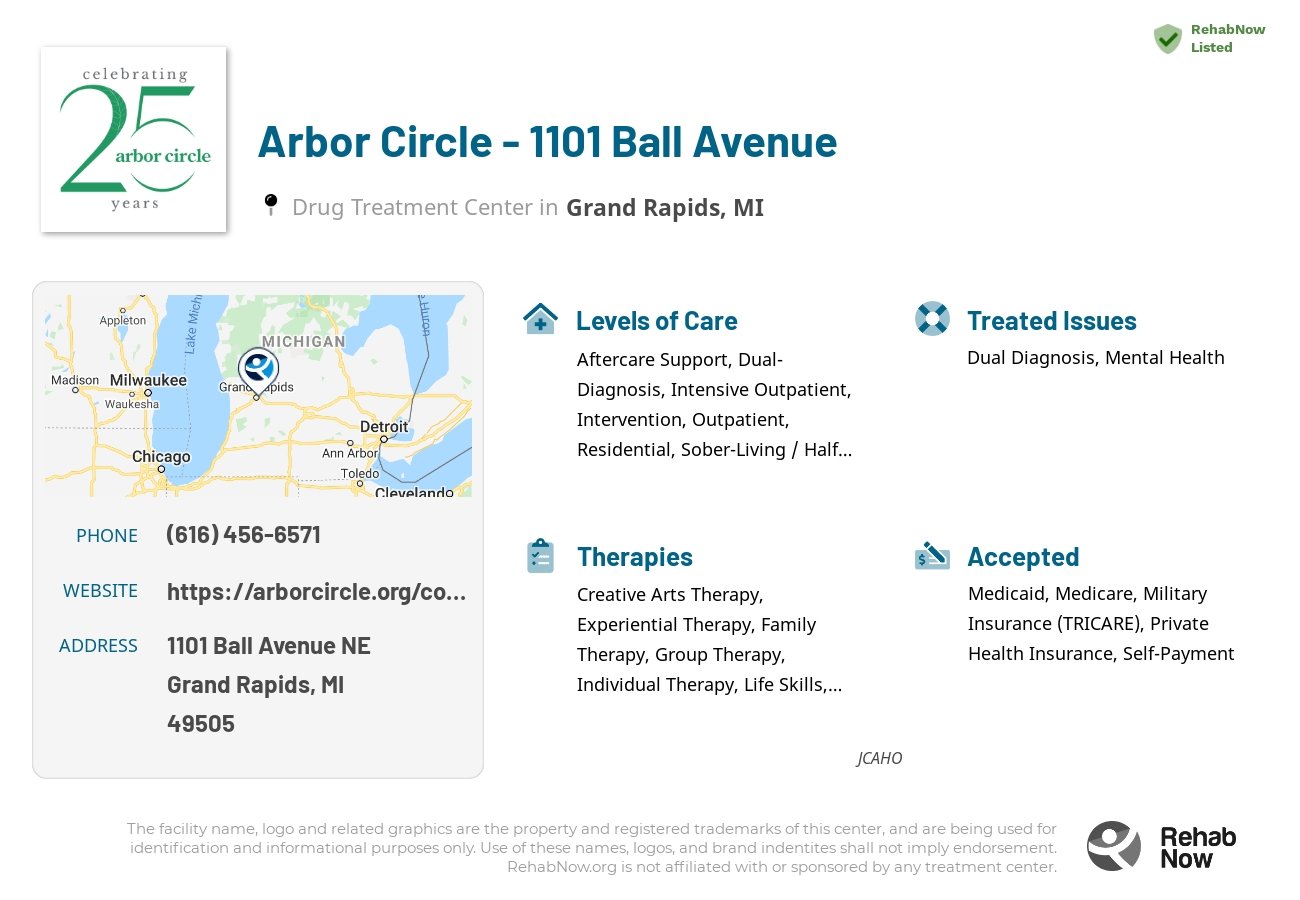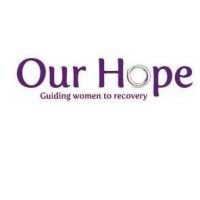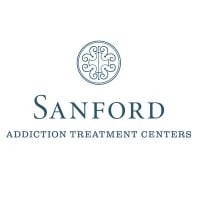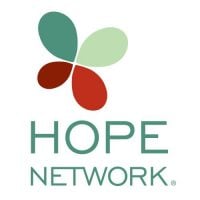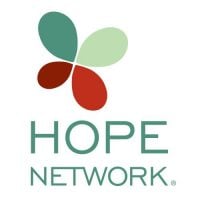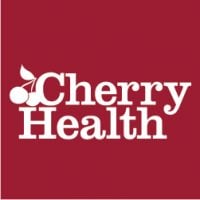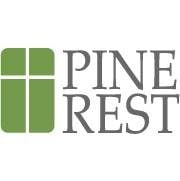Arbor Circle - 1101 Ball Avenue
Drug Rehab Center in Grand Rapids, Michigan
Arbor Circle - 1101 Ball Avenue provides comprehensive mental health services, with a focus on addiction and substance abuse treatment, through personalized, evidence-based approaches and empowering individuals and families to achieve long-term recovery.
About Arbor Circle - 1101 Ball Avenue in Michigan
Arbor Circle - 1101 Ball Avenue in Grand Rapids, Michigan is an organization that offers comprehensive mental health services to people in the community. Their main focus is helping individuals who are affected by addiction and substance abuse, providing a variety of treatment options such as residential rehabilitation and outpatient therapy. They also provide guidance, education, and support to help empower people to achieve long-term recovery.
In addition to traditional treatment options, Arbor Circle - 1101 Ball Avenue also provides medically managed detoxification, recovery coaching, and family therapy to help individuals and their families address the complexities of addiction and addiction recovery. Furthermore, they have a strong emphasis on self-empowerment, which is reflected in the organization’s commitment to providing evidence-based treatment that is personalized to meet the individual needs of the client.
Arbor Circle - 1101 Ball Avenue is accredited by the Michigan Department of Health and Human Services and is certified by the Commission on Accreditation of Rehabilitation Facilities (CARF). The organization also holds several awards and recognitions for their excellent services, including being honored as one of the top addiction treatment centers in Michigan by Mental Health Resources.
Genders
Ages
Modality
Additional
Accreditations

JCAHO
Conditions and Issues Treated
Levels of Care Offered
This center offers a variety of custom treatment tailored to individual recovery. Currently available are Aftercare Support, Dual-Diagnosis, Intensive Outpatient, Intervention, Outpatient, Residential, Sober-Living / Half-Way, with additional therapies available as listed below.
Intensive outpatient treatment is a type of comprehensive addiction care. Unlike conventional residential treatment programs, the patients live at home during the recovery process. This means that one can continue working and caring for their families. These also allow people to keep pursuing their studies while also working on their sobriety.
Outpatient treatment can help one transition to normal life from the round-the-clock supervision and treatment available during inpatient treatment. It is an excellent tool to ensure long-term recovery. However, it is essential to note that intensive outpatient treatment in itself does not remove patients from the real-world setting. This means there’s always a higher risk of coming across environmental triggers. To further prevent relapse, an outpatient treatment center should be able to provide ongoing support services.
Once the patient is enrolled in an intensive outpatient treatment program, they will be expected to attend therapy and group meetings daily for a stipulated period. The frequency and duration of each session will depend on the patient’s needs and level of addiction. This can help curb the habit and deal with underlying issues that led to it. Most of these professional treatments are designed to allow patients to structure their daily schedules in a way that is conducive to recovery.
“Outpatient treatment is ideal for those who have a lower intensity addiction. It’s also suitable for those with a supportive environment and those on a tight budget.
Outpatient treatment can be considered the lowest intensity level of addiction treatment. It is ideal for early phase addiction or lower intensity addictions. It may involve weekly sessions instead of daily. Peer group support, 12-step programs, and individual counseling may still be used and anti-addiction medication.
Sober living homes are halfway houses where people can stay for a while and stabilize themselves—no drinking or drugging, paying rent/bills, etc. There is no minimum or maximum stay, but as long as you follow these simple guidelines, it’s an excellent chance to move forward into sobriety!
For many, this is a new beginning, a reset. The opportunity to establish new routines and healthy habits that will result in long-term sobriety is given to those who have lost everything due to addiction. It’s also common for people to move from one sober living home to another, each step closer to a drug and alcohol-free life.
Residential treatment programs are those that offer housing and meals in addition to substance abuse treatment. Rehab facilities that offer residential treatment allow patients to focus solely on recovery, in an environment totally separate from their lives. Some rehab centers specialize in short-term residential treatment (a few days to a week or two), while others solely provide treatment on a long-term basis (several weeks to months). Some offer both, and tailor treatment to the patient’s individual requirements.
Drug rehab intervention aims to make sure patients understand the risks of their addiction and possible outcomes. They must learn how their addiction affects those around them and allow a therapy session to help move past the physical symptoms. They often include psychotherapy or behavioral therapy, group therapy, family counseling, and peer support.
Aftercare support is vital to those who have completed a drug or alcohol treatment program. This support comes in individual and family counseling, treatment of psychiatric and other medical conditions, and medications to reduce cravings. It helps recovering addicts adjust to normal day-to-day activities and can last for a year or longer.
The majority of drug and alcohol addicts who receive aftercare treatment do not relapse. It is estimated that without aftercare, the relapse rate will be between 70 to 90 percent for most people. Aftercare is the final stage in addiction recovery, but it will also help maintain sobriety if relapse does occur.
Therapies & Programs
No single treatment works for all addicts; therefore, the goal of treatment and therapy should be to find what works best for each individual. Some people requiring addiction treatment may only need a few weeks of inpatient care. Others will require long-term residential care. Tolerance and withdrawal levels vary from person to person and thus affect the intensity of the treatment needed.
If an individualized approach to treatment and therapy is not offered, addicts may fail to reap benefits from their efforts. Professionals must customize plans according to their patient’s needs, limitations, and strengths. The goal of all forms of addiction treatment should be for addicts to find healthy ways to cope with their addiction and its underlying causes.
The therapies usually include siblings, children, and parents who are involved in their daily lives. These sessions are vital because they address past issues that may have hampered an addict’s or alcoholic’s recovery and provide support at a crucial time!
One of the most critical aspects of family therapy is helping addicts’ loved ones see their situation in a new light. It’s also one of the most challenging things a family can do when a loved one struggles with addiction or alcoholism.
Group therapy is held in a safe, controlled setting where patients can feel comfortable sharing their struggles and gaining perspective through shared conversations. It takes place in a group rather than one on one to prevent feelings of isolation or being unique in their situation while creating an environment for addicts at Arbor Circle - 1101 Ball Avenue to develop fellowship, accountability, and support. Group therapy is an important tool in recovery that prevents cravings that prompt a return to active addiction.
This type of therapy involves the use of a variety of therapeutic techniques to help addicts recover from past traumas that might have triggered their substance abuse. During these sessions, therapists will work with the addict to address painful memories and learn how to cope effectively with stressors as they arise.
During these types of sessions, therapists will typically focus on three main goals:
- Identifying and expressing painful emotions associated with past traumas.
- Reducing the effects of stress on an addict’s life by developing more effective coping mechanisms.
- Developing healthy ways of thinking about stressful situations that can help addicts avoid substance abuse issues in the future.
This type of therapy is typically used in conjunction with other types of addiction treatment services. By identifying and dealing with the root cause of addiction, most addicts can overcome their cravings and prevent relapse once they leave rehab.
Many different types of addiction treatment services exist to help addicts safely get sober, but it’s important for recovering individuals to find a therapist or support group that will help them address the root cause of their addiction.
Cognitive-behavioral therapy is a talking-based method that helps people struggling with addiction replace destructive behaviors with healthier ones. CBT also helps them identify the underlying thoughts and beliefs that cause these behaviors in the first place and ways to control those thoughts and feelings. It can be administered as a holistic therapy or as part of combination therapy and—as opposed to turning to drugs and alcohol—helps addicts learn how to respond to negative thoughts instead.
Life skills training is beneficial for addicts in recovery because it helps them learn how to take care of themselves and improve their quality of life, which can promote feelings of purpose and motivation.
This type of treatment works by teaching individuals life-enhancing skills that support positive living, including:
- Healthy lifestyle habits
- Skills to effectively manage stress
- Effective communication skills to help them get their needs met without turning to drugs or alcohol
- Money management and budgeting skills so they can continue to take care of themselves after treatment ends.
Patient Experience
Creative Arts
Creative arts therapy is a form of expressive therapy that uses painting, music, poetry, and other creative means to help those battling addiction. It is beneficial for patients to release negative feelings and emotions and explore how their thoughts and emotions play out through the creative process. Arbor Circle - 1101 Ball Avenue in Grand Rapids, MI, offers creative art therapy to help patients cope with addiction and its after-effects.
Experiential Therapy at Arbor Circle - 1101 Ball Avenue
Experiential Therapy is used by drug treatment facilities to treat substance abuse. This treatment is clinically proven to help addicts in detoxification by allowing them to release emotions in a safe environment. The treatment process involves addicts painting their feelings and releasing them on a canvas.
One of the most popular forms of experiential therapy is known as LPE – Love, Peace, and Equilibrium. Amy Gumowitz developed this treatment in 1992. By implementing her philosophy of “reality therapy” into the treatment, Gumowitz’s results were outstanding. Once her success was validated by those she had been helping, she decided to open her treatment center. Although Gumowitz passed away in 2007, her contribution to the addiction recovery remains effective, and better yet, it is 100% self-sufficient.
Payment Options Accepted
For specific insurance or payment methods please contact us.
Is your insurance accepted?
Ask an expert, call (888) 674-0062
Arbor Circle Associated Centers
Discover treatment facilities under the same provider.
- Arbor Circle Corporation - Grand Rapids in Grand Rapids, MI
- Pathways - Holland in Holland, MI
- Arbor Circle Counseling Services in Newaygo, MI
- Arbor Circle Counseling Services - Newaygo County in Newaygo, MI
- Pathways - Allegan in Allegan, MI
Learn More About Arbor Circle Centers
Additional Details
Specifics, location, and helpful extra information.
Grand Rapids, Michigan 49505 Phone Number(616) 456-6571 Meta DetailsUpdated November 25, 2023
Staff Verified
Arbor Circle - 1101 Ball Avenue Patient Reviews
There are no reviews yet. Be the first one to write one.
Grand Rapids, Michigan Addiction Information
Michigan has the second-highest rate of drug and alcohol abuse in the nation. Heroin is linked to more than 50% of the state's hepatitis C cases. Marijuana is the drug most often associated with crimes in Michigan, followed by methamphetamines. Opioids alone are responsible for almost 20% of all drug overdose deaths in Michigan.
In 2012, there were 97 drug-related deaths in Grand Rapids, Michigan. There are 9,518 hospitalizations due to drug abuse that same year. The most common drugs of abuse are heroin, marijuana, and prescription drugs. There are many different types of drug addiction, and each one requires a specific approach to treatment. The goal of treatment is to help the individual overcome their addiction and learn how to live a sober life.
Treatment in Nearby Cities
- Clarkston, MI (113.4 mi.)
- Chelsea, MI (93.9 mi.)
- Jonesville, MI (84.9 mi.)
- Pigeon, MI (132.3 mi.)
- Imlay City, MI (129.2 mi.)
Centers near Arbor Circle - 1101 Ball Avenue
The facility name, logo and brand are the property and registered trademarks of Arbor Circle - 1101 Ball Avenue, and are being used for identification and informational purposes only. Use of these names, logos and brands shall not imply endorsement. RehabNow.org is not affiliated with or sponsored by Arbor Circle - 1101 Ball Avenue.
